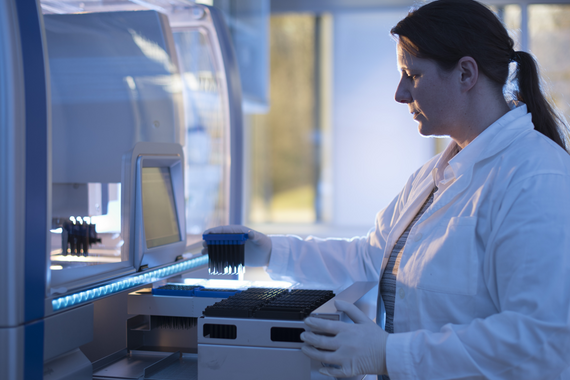Christian Doppler Labor Liquid Biopsy

Video aus der Reihe "Wissenswert"
PI's: Ellen Heitzer, Jochen Geigl
Focus: Tumors release components such as of cell-free DNA fragments (ctDNA, circulating tumor DNA) or viable cells (CTC, circulating tumor cells) into the circulation, which reflect their genetic or epigenetic landscape. Therefore, CTC and ctDNA can be used for molecular profiling and prognostication purposes for malignant diseases from blood and other body fluids. The Liquid Biopsy (LB) holds great promise for precision and personalized medicine and in particular, ctDNA has been demonstrated to be a valuable tool to detect cancer recurrence, to predict tumor burden and treatment response, as well as to identify resistance mechanisms and the emergence of novel actionable targets has been proven in numerous studies summarized monitor recurrence, resistance, metastasis and minimal residual disease. Our LB group at the D&F Institute of Human Genetics has extensive experience in the analysis of plasma DNA. We have established a plethora of plasma DNA based approaches to study genome-wide SCNAs and high-sensitivity approaches to detect specific mutations occurring at low allele frequencies. In this highly competitive field, our group is one of the most renowned in the field.
Network: Our group has many fruitful collaborations with the university as well as at national and international level.
Medical University of Graz: We have experienced clinical partners various types of solid tumors at the Division of Oncology, the Department of Gynecology as and the Department of Urology. Moreover, we collaborate with the Departments of Hematology, Pediatric Haematology/Oncology and Orthopedic in the context of hematological diseases and sarcoma. In addition we have a longstanding collaboration with the Institute of Pathology at the MUG or the Department of Pathology, at the LKH II. Furthermore, we have an intensive collaboration with the Institute for Medical Informatics, Statistics and Documentation.
Our liquid biopsy-related research is performed within established international networks, i.e. through the CANCER-ID consortium (www.cancer-id.eu), a public-private partnership supported by Europe’s Innovative Medicines Initiative (IMI), which was coordinated by the University Medical Center Hamburg-Eppendorf (Prof. K. Pantel), University of Twente (Prof. L. Terstappen), Bayer HealthCare (Dr. T. Schlange) and Menarini (Dr. B. Baggiani) and which is now being continued by European Liquid Biopsy Society (ELBS).
Moreover, we have well established connections to leading liquid biopsy groups at the University of Cambridge, Cancer Research UK, the Memorial Sloan Kettering Cancer Center, the University of Wisconsin, University Medical Center Groeningen etc.
Our expertise has been recognized internationally by invitations to international congresses, reviews and book chapters in international journals.

Liquid Biopsy has a wide range of uses in cancer treatment and is used for ongoing monitoring of the course of therapy. It is also considered to be a promising approach for early cancer detection by examining a blood sample without tissue biopsies. A Christian Doppler Laboratory was set up together with corporate partner Freenome Holdings and funded by the Federal Ministry for Digitization and Business Location.
For a broad use of Liquid Biopsy outside of clinical studies and research projects, the sensitivity and accuracy or the predictive and prognostic value of the ctDNA must be evaluated in large prospective studies.